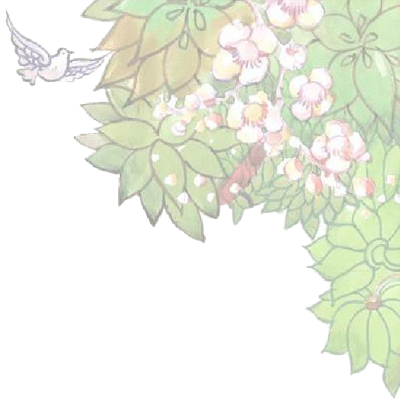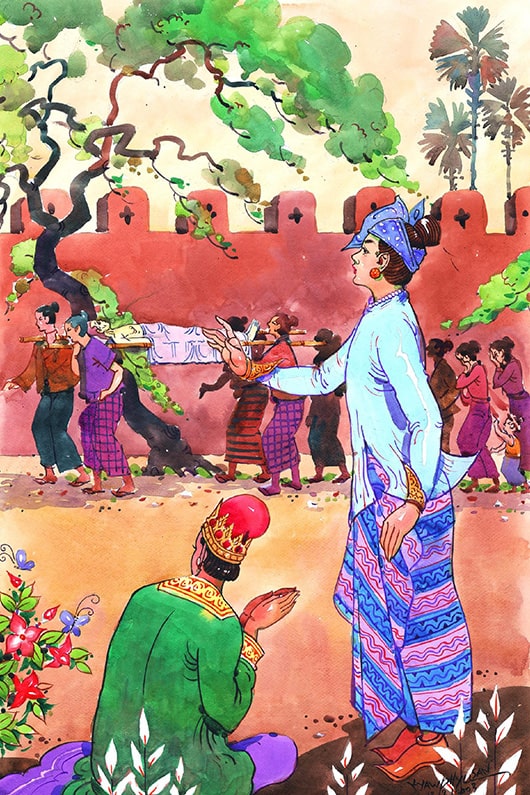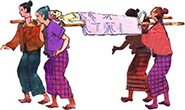12話 三番目の予兆

第1部 出家まで
第4章 重大な前ぶれ
12話 三番目の予兆・・・・一つの死体

二度目の外出から王子が帰ってきた後、スッドーダナ王は、王子が出家して世捨て人にならないようにと、気晴らしになる催し物をたくさん手配した。このためシッダッタ王子は、宮殿生活の娯楽や贅沢を楽しんで時を過ごし、宗教的なものへ駆りたてられる思いは、いくぶんか弱まった。
しかしながら約四か月後、また再びシッダッタ王子は、宮殿から外出してもっと街を見たい、と願い出た。王は不承不承、応じた。わが息子の外出を止めるのはもはや無駄で、ただ不幸にするだけだろう、と王は考えたのである。
この前の外出のように、シッダッタ王子は上流家庭の若者になりすました。お供はチャンナだけで、かれも素性を隠すために身なりを変えていた。その朝、ふたりは宮殿から出て、カピラヴァットゥの都を歩いた。王子は楽しそうに人びとの活動を見た。じっくり人びとの活動を見るため、何度か、店や人ごみに立ち寄ったりした。いくつかの店の主人は、いらっしゃいと声をかけ、何か買うのか、ときいてきた。商っている物をみてください、と呼びかける者がいる一方、王子だと気づかず、仕事を続けたまま無視する者もいた。とはいえ、もくろみどおり変装が功を奏していたので、このような自然な応対のすべてが王子を幸福にさせるだけであった。
そのあとの道すがら、王子は人びとの行列が通りにやってくるのを見た。前のふたりと後のふたりで担架をもち、その上に、とても細い男が横たわったまま動かず、布がかけられている。残りの者たちはたいへん悲しそうな表情を浮かべながら、それに続いて歩いているのだ。そのうちの何人かは悲しみを抑えきれず、声を上げて泣いている。にもかかわらず、かれらは目的地に向かって歩いているのだった。
何が起きているのか分からず、王子はお供の御者に尋ねた。
「チャンナ、あの行列を見ろよ! あれは何をやっているんだ? なぜ、行進しながら、嘆いているんだ? なぜ、板の上に寝ている人は、ひとことも言わず、四人の男たちが持ちにくそうに運んでいるんだ?」
「殿下、あの男は死んでおります。かれらが持ちにくそうに運んでいることなど、何も知らないし、何も言いません。あの男の家族や親族は、これから男を火葬に致しますが、そのあとはもう、お互い見ることもないのです。それで、あのように泣いているのでございます」
「死んでいる? ふーん・・・それは奇妙にきこえるな、わたしには」と、王子はつぶやいた。それでもやはり、行列をずっと見ていた。
火葬場に着くと、用意されていた山積みの薪の上に男をのせ、薪に火をつけた。
王子は、死んでいる男にかれらがしたことを見ながら、ほんとうに衝撃を受けた。ぎゅっと自分の手を握りしめ、夢ではないか、と確かめるために、眼をこすった。一方、死者の親族は死体のまわりを囲み、とうてい抑えられない悲しみで泣き叫んでいて、それが誰の心にも響いた。悲嘆にくれて、何か言いながら髪をかきむしり、胸をたたいているのだ。
まさに自分の目の前で起きていることにすっかり目がくらみ、王子は火葬の儀式を胸が引き裂かれるような思いで見ていた。しばらく、ひとことも話せなかった。そのあと、ふるえる声で御者にきいた。
「チャンナ、『死』って、ほんとうにどういう意味なんだ? なぜ、あの男は動かないまま、あそこに横たわっているんだ? そして、なぜ、自分が親族によって焼かれるがままにしているんだ? 焼かれているとき、痛みを感じないのか?」
「殿下、ひとは死ぬと意識がなくなり、もはや体になにも感じなくなるのでございます。眼があっても何の形も見えません。耳があっても何の音も聞こえません。鼻があっても何の匂いもしません。舌があっても、どんな食べ物の甘味、苦味、酸味、塩味もわかりません。そして、体があっても、熱い、冷たい、柔らかい、硬いといった感触を感じません。どんなものの意識もなく、すでに死んでいるので、どんな感触も、まったく感じないのです」
「しかしチャンナよ、わたしもまた、あの男のように死を免れないのか? 父も、母も、妻のヤソーダラーも、わたしの知っているすべての人たちもまた、死を免れないのか? 死の性質を乗りこえられる者は誰もいないのか?」
「はい、そのとおりでございます、わが親愛なる王子さま! 生きている者は誰でも、いつかあの男のように死ぬのです。死がやってきたとき、避けたり、止めたりする道はありません。誰も永遠には生きられません。そして誰も死を乗りこえられません。お父上の王さま、お母さま、お妃さま、殿下ご自身、そしてすべての愛しい親族の方々、わたしも含めて、いつか死にます。そうした方々はいずれ、殿下を見られなくなりますし、殿下もある日、見られなくなるのでございます」
この不愉快な光景は、誰かふせぐことのできる者がいない限り、起きてしまうのだ。それはこの三度目の外出で、シッダッタ王子の心に深く響いた。王子は、もはや外出をつづける気分ではなくなった。お供のチャンナが後につづいて、王子はひっそりと宮殿に戻り、それから、ひとりで自分の部屋に入った。坐りこみ、見たものを深く考え、みずからに、こういった。
「誰でもいつか死なねばならず、誰もそれを止められない、とは、ほんとうにおぞましいな。これを乗りこえる道がきっとあるにちがいない。父、母、ヤソーダラー、愛しい親族のすべてが、老いや病い、死に見舞われない道をわたしはみつけよう」
チャンナは、死体を見て王子が急いで戻ってこられた、と王に報告した。これをきいて王はたいへん悲しみ、困惑した。息子が不愉快なものごとを見ないようにと最大限の配慮をしてきたにもかかわらず、予想外の事態が三度目の外出で起きたのだ。それは、八人のバラモンが予言していたことだった。
※ 画像やテキストの無断使用はご遠慮ください。/ All rights reserved.

Episode 13. THE THIRD GREAT OMEN: A CORPSE
THE THIRD GREAT OMEN: A CORPSE
After the prince’s return from his second tour, King Suddhodana arranged many kinds of entertainments to distract his attention from renouncing the world and becoming a recluse. Thus, Prince Siddhattha spent his time enjoying the pleasures and luxuries of the palace life, and his sense of religious urgency became slightly diminished.
However, after about four months, Prince Siddhattha once again requested to go out of the palace to see more of the city. The king unwillingly consented; he thought that it was no use anymore to prevent his son since it would only make him unhappy.
As in the last tour, Prince Siddhattha disguised himself as a youth from a noble family and was followed only by Channa, who also dressed differently to conceal his identity. They went out of the palace walking in the City of Kapilavatthu that morning. The prince cheerfully saw the people’s activities. A few times, the prince
approached some shops and the crowds to see their activities closely. Some of the shopkeepers welcomed him and asked him whether he would buy anything. Some called the prince to look at their merchandise. Meanwhile, some others neglected him and carried on with their business as they did not recognise him as their prince. However, all these natural responses only served to make the prince happy, for his
disguise worked as planned.
Then on the way, he saw a procession of people coming along the street. Two persons in front and two others at the back were carrying a bier on which a very thin man laid flat and still, covered with a cloth. The rest walked following them with a very sad expression on their faces. Some of them could not control their sadness and burst out crying. However, they proceeded walking to their destination.
Not knowing what was happening, the prince turned to his charioteer asking: “Channa, look that procession! What are they doing? Why are they marching along and lamenting? Why did that person lying on the board not say a word though the four men are carrying it clumsily?”
“Your Majesty, that man is dead. He can neither know nor say anything although they are carrying him clumsily. Now they, his family and relatives, are going to cremate him, and after that they will not see each other any longer. That’s why they are crying,” Channa explained.
“Dead? Hmm… It sounds strange to me,” the prince mumbled. Nevertheless, he kept observing the procession.
Arriving at the cremation spot, they rested the person on a prepared pile of wood and set the wood on fire. The prince was really shocked seeing what they did towards the dead man; he pinched his own arm and rubbed his eyes to make sure that he was not dreaming. In the meantime, the relatives of the dead surrounded the corpse and wailed so uncontrollably that its sound would touch anyone’s heart. They were tousling their hair and beating their chests while uttering something to express their sorrow.
Being utterly dazed by what was happening before his very eyes, the prince watched the cremation ceremony heartrendingly. For a moment, he could not say a single word. Then with a trembling voice, he asked his charioteer: “Channa, what does ‘dead’ really mean? Why does the man keep lying down there without moving? And, why does he let himself be burnt by his relatives? Doesn’t he feel pain when he is burnt?”
“Your Majesty, when a man dies, he does not have consciousness or feeling any longer in his body. He cannot see any forms though he has eyes. He cannot hear any sounds though he has ears. He cannot smell any odours though he has a nose. He cannot taste any food as sweet, bitter, sour, or salty though he has a tongue, and he cannot feel any bodily touch as hot, cold, soft, or hard though he has a body. He is
not conscious of anything and he has absolutely no feeling for any touch as he is already dead,” replied Channa.
“But Channa, am I also subject to death like that man? Will my father, mother, my wife Yasodharā, and all the people I know be also subject to death? Is there anyone who can overcome the nature of death?” the prince asked further.
“Yes, that is so, my dear prince! Anybody who is alive will die someday like that man. There is no way to avoid or to stop death when it comes. No one can live forever. And no one can overcome death. It is certain that one day, your royal father, mother, your wife, you yourself, and all your beloved relatives, including me, will die. They will never see you anymore, nor will you see your relatives any longer one day,” Channa explained.
This unpleasant sight occurred without anyone able to prevent it. It deeply touched the prince’s heart for the third time of his tour. Prince Siddhattha has no more mood to continue his visit. Followed by Channa, he quietly returned to the palace, and alone he went into his room. He sat down and thought deeply about what he had seen. He said to himself: “It is so horrible that everybody must die one day, and no one can prevent it. There must be some way to overcome this. I shall find out the way so that my father, mother, Yasodharā and all my beloved relatives will never be plagued by old age, sickness and death.”
Channa told the king that the prince had come back in a hurry after seeing a corpse. Hearing this, the king became very sad and worried. And although he had strived with utmost care to prevent his son from seeing unpleasant things, an unexpected sight occurred for the third time as predicted by the eight brahmins.
※ 画像やテキストの無断使用はご遠慮ください。/ All rights reserved.
アシン・クサラダンマ長老
1966年11月21日、インドネシア中部のジャワ州テマングン生まれ。中国系インドネシア人。テマングンは近くに3000メートル級の山々が聳え、山々に囲まれた小さな町。世界遺産のボロブドゥール寺院やディエン高原など観光地にも2,3時間で行ける比較的涼しい土地という。インドネシア・バンドゥンのパラヤンガン大学経済学部(経営学専攻)卒業後、首都ジャカルタのプラセトエイヤ・モレヤ経済ビジネス・スクールで財政学を修め、修士号を取得して卒業後、2年弱、民間企業勤務。1998年インドネシア・テーラワーダ(上座)仏教サンガで沙弥出家し、見習い僧に。詳しく見る
奥田 昭則
1949年徳島県生まれ。日本テーラワーダ仏教協会会員。東京大学仏文科卒。毎日新聞記者として奈良、広島、神戸の各支局、大阪本社の社会部、学芸部、神戸支局編集委員などを経て大阪本社編集局編集委員。1982年の1年間米国の地方紙で研修遊学。2017年ミャンマーに渡り、比丘出家。詳しく見る

※ 画像やテキストの無断使用はご遠慮ください。
All rights reserved.

